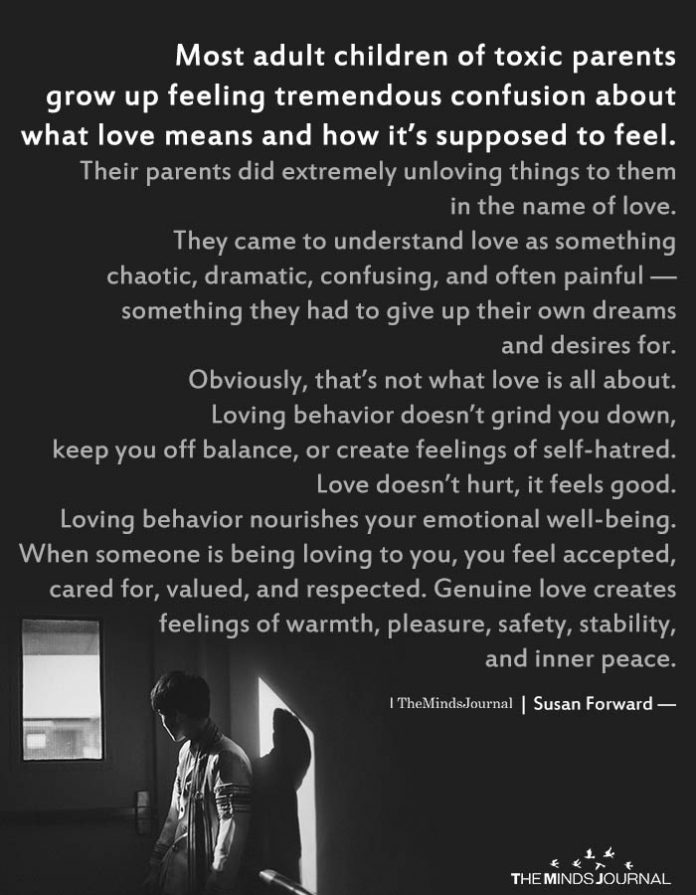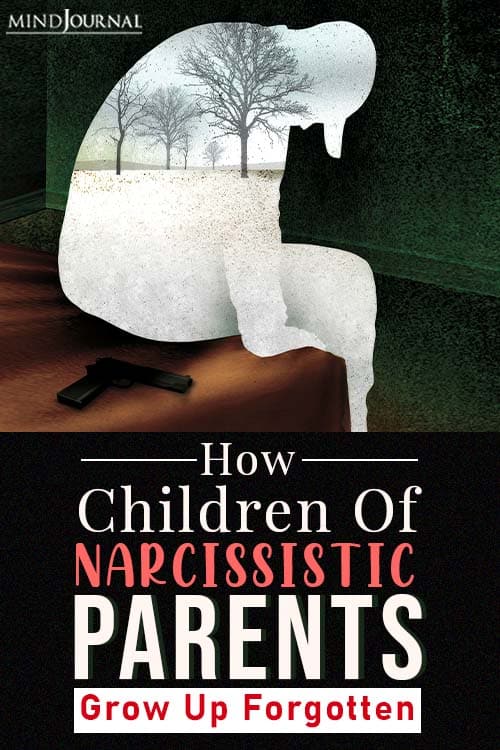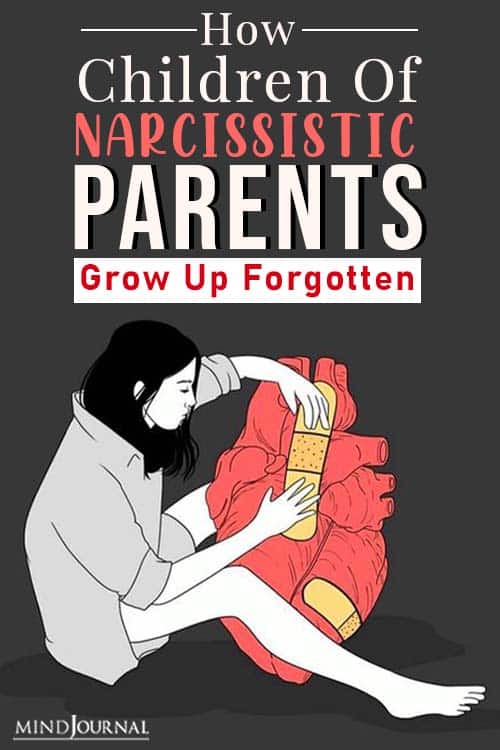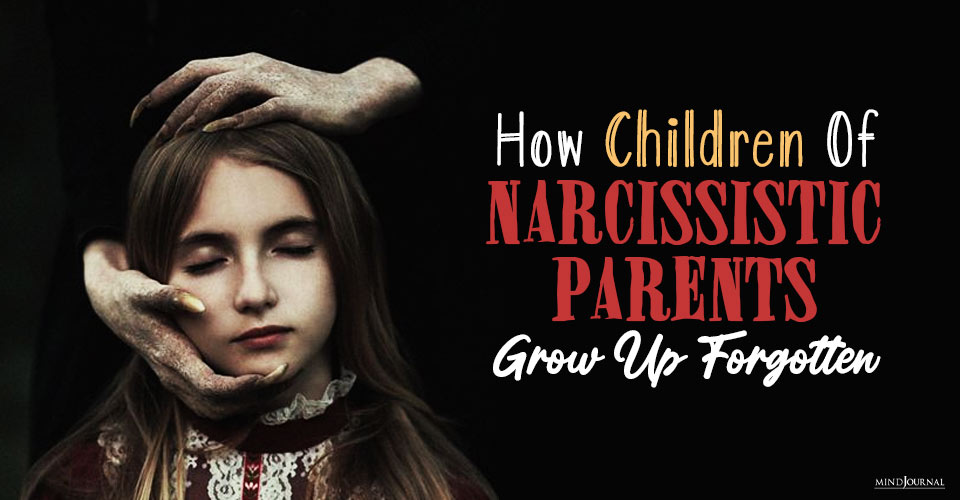“Children who have a narcissistic parent are taught/programmed to believe that they have no rights. They learn that their feelings are wrong, invalid, and unimportant. Therefore the child hides their feelings out of fear of the parent’s wrath.” – Tina Fuller
Narcissism is identified by several key traits; among them, an inability to love or appreciate anyone but themselves. Sure, narcissists get married, have children, and otherwise engage in friendships and social relationships, but there is always a reason. A narcissist will not waste time in any situation unless they benefit.
Sadly, this is true even of their own children. Decades of research has shown that both clinical and nonclinical narcissists engage in self-promotion, interpersonal validation, and exploitation of others (Emmons, 1987; Paulhus, 1998; in Zuckerman & O’Loughlin, 2009). Every relationship must have a purpose, and that purpose must be to keep the narcissist in the spotlight and in total comfort.
Related: 13 Signs Of A Toxic Parent
Children are extremely vulnerable to a parent’s perceived narcissistic behaviors. Whereas some will grow up to become narcissistic individuals themselves, others are caught in a constant cycle of searching for relationships without manipulation and pain. Compassion, warmth, and stable emotions are all lacking in narcissistic relationships; being raised in an environment of non-empathy can lead to difficult relationships later in life.
Jenny*, a 25-year-old daughter of emotionally and physically abusive parents, confirms that her narcissistic upbringing has made it difficult to connect emotionally with others. “The intimacy struggle is real,” she says. “It’s hard to get close to friends. When it comes to a significant other, the fear of abuse is there. It’s a mess.”
Parental acceptance is a manifestation of warmth, affection, care, comfort, concern, nurturance, support, and love (Finzi-Dottan & Cohen, 2017). On the other hand, parental rejection is distinguished by controlling behaviors, disapproval, and strict discipline. Narcissistic parents may be incapable of creating or upholding a positive, growth-oriented environment for children.
“I was never comforted as a child when I was sad or hurt. I was left to cry alone or told to shut up,” Jenny recalls. Children of narcissists are highly susceptible to traveling down one of two negative roads: surrendering to the environmental influences and developing their own narcissistic traits, or spending their social lives in an endless cycle of codependence and negative relationships. Jenny has stopped trying to build a relationship with her parents and does not share details of her life with them.
Even children who grow into narcissistic teens and adults often do so with the intent of trying to please their parents. Sadly, such parents can never be pleased. The child will forever search for love, visibility, and recognition (Talmon & Ginzburg, 2019).

Says Jenny, “My parents are not proud of anything I’ve accomplished…and I feel like I’ve made it far. I’m taking college classes, have my own car and own apartment, and my puppy. I’m doing everything on my own, but nothing I do makes them proud. I cannot recall a single instance when they have been proud of me.” Jenny’s older sister, unfortunately, is “following in the footsteps” of their parents and exhibits the same negative traits. Jenny has limited contact with her as well.
Birthdays, holidays, and any positive event must focus around the narcissist, even if the celebration is for someone else. Adam, 18, grew up with a grandiose narcissistic single mother and recalls how his school achievements were heralded as proof of what a great mother she was, even though she did not help with studying or projects. “She took credit for every high grade I achieved, and it was all about her at parent-teacher conferences,” he says.
However, when Adam was in trouble at school for talking back to teachers or failing a test, his mother would fly into a rage: “She would scream at me and follow me around the house, shouting that I embarrassed her and how useless I am and what a disappointment. It always went back to what she did for me and how my behavior makes her look bad.”
Children of narcissists are not seen as individuals worthy of their own successes or mistakes; the child is simply an extension of the parent.
Related: 5 Signs You Are The Child Of A Toxic Parent
Anastasia is a married mother of three energetic and happy boys. Her maternal grandmother was a narcissist and she, too, would always insist on all events and attention being focused on her. Because of this, Anastasia has “very negative feelings toward holidays” because her mother would be more concerned with the grandmother’s demands than her children’s needs.
Anastasia described the relationship between her mother and grandmother as “dysfunctional” and responsible for her mother and father’s divorce almost 40 years ago. “Now that my mother is older and in assisted living, the narcissism is manifesting more and more,” Anastasia says. She describes her mother as manipulative; for example, Anastasia does not tell her mother about upcoming trips or events because she will suddenly have an “emergency” and require attention to be shifted to her.
Like Jenny and Adam, Anastasia was responsible for her own well-being as a child. Each can recount having to handle their own laundry, time management, emotional pain, cooking and cleaning, and other traditional caregiver responsibilities.
Related: 12 Signs You Have A Toxic Parent and How To Deal With It
All three described having to break away from their narcissistic parents either physically, emotionally, or both. Jenny moved into her own apartment and cut off communication; Adam went to college out of state and will only text or email his mom. Anastasia says she “compartmentalizes” her mother and does not allow her easy access to her sons: “I make sure my kids have choices about spending time with her rather than force. I am trying to break the cycle.”
Regardless of age, gender, or other relationships, a narcissistic parent’s behavior deeply affects a child. It is difficult but possible to break the cycle of abuse and create a new life free of manipulation and ill intent. Speaking with a counselor or therapist can be helpful, as can creating boundaries or physical or emotional barriers. No matter which defensive mechanism one chooses, the most important aspect is realizing their own self-worth.
Pathological narcissists may have an impediment to love relations (Kealy & Ogrodniczuk, 2014) but that doesn’t mean their children must be doomed to the same fate.
* Names have been changed for confidentiality purposes. Participation was voluntary.
References:
Finzi-Dottan, R. & Cohen, O. (2017). Involvement and acceptance of custodial fathers: the role of narcissism and caregiving. Psychology of Men & Masculinity, 20(1), 82-92. Kealy, D. & Ogrodniczuk, J.S. (2014). Pathological narcissism and the obstruction of love. Psychodynamic Psychiatry, 42(1) 101-120. Talmon, A. & Ginzburg, K. (2019). The intricate role of dissociation in the relations between childhood maltreatment, self-objectification, and narcissism. Psychological Trauma: Theory, Research, Practice, & Policy, 11(8), 909-918. Zuckerman, M. & O'Loughlin, R.E. (2009). Narcissism and well-being: a longitudinal perspective. European Journal of Social Psychology, 39, 957-972.
Written By Kristy Lee Hochenberger Originally Published In Psychology Today
Frequently Asked Questions
What disorders do children of narcissistic parents have?
Children of narcissistic parents are likely to develop a distorted self-image and insecure attachments. They tend to struggle with self-esteem, guilt, indecision, perseverance, loyalty, and emotional dysregulation.
How do I get over my narcissistic parental abuse?
Learn about narcissism and identify the narcissistic behavior. Accept the situation and release any anger or resentment toward your parent, for your own healing. Cut the cord with your narcissistic parent and move on with your life.
How do you deal with a malignant narcissistic father?
Ensure your safety by confiding in people whom you trust. Identify the narcissistic behavior and try to keep proof. Accept the situation, stay calm, and get emotionally strong. Finally, walk away as soon as possible.
How do I deal with an abusive narcissistic mother?
Educate yourself on narcissistic abuse. Look back at the past and identify unhealthy patterns. Accept the reality and seek support from reliable and healthier relationships. Work on yourself and be more confident and assertive. If needed, get legal help and walk away.
How do you cut a narcissistic parent out of your life?
Realize that your well-being is your priority. Get emotionally disengaged, set firm boundaries, and gradually snap contact. Don’t get confrontational but expect your parent to make matters difficult for you. Never get guilt-tripped into letting them back in your life.













Leave a Reply